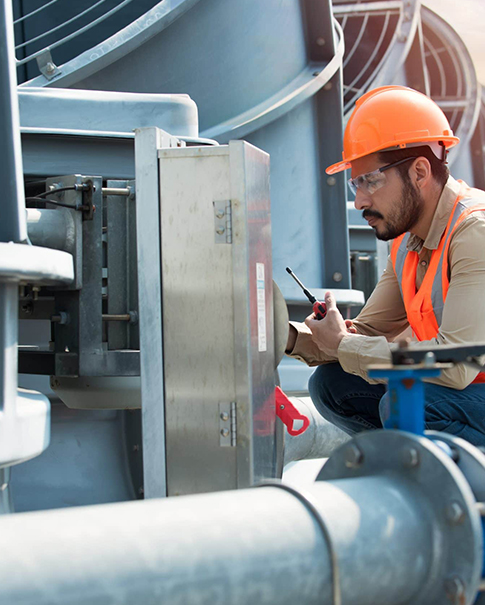Choosing Between Air Cooled and Water Cooled Chillers: Which One is Right for You?
Jan 20, 2025
When it comes to purchasing an industrial chiller, one of the most important decisions you'll face is whether to go with an air cooled chiller or a water cooled chiller. Both options offer effective cooling solutions, but each comes with its own set of advantages and limitations depending on your specific needs, operational environment, and budget. In this blog, we’ll break down the differences between these two types of chillers and help you determine which one is best suited for your business.
What Are Air Cooled and Water Cooled Chillers?
Before diving into the pros and cons, it’s important to understand the basic differences between air cooled and water cooled chillers.
Air Cooled Chillers: These chillers use the surrounding air to dissipate heat. The condenser is equipped with fans that blow air through the condenser coils to cool down the refrigerant.
Water Cooled Chillers: These units use water to absorb and carry away heat from the refrigerant. A cooling tower, often placed outside the building, circulates water to absorb heat and releases it into the atmosphere.
1. Installation and Space Considerations
Air Cooled Chillers are generally easier and quicker to install. Since they rely on air for cooling, there's no need for external cooling towers or additional water treatment systems. This makes them an ideal choice for businesses that may have limited space or those that need a more flexible, less complex installation process. They are perfect for smaller facilities or those located in areas where space is limited.
On the other hand, Water Cooled Chillers require additional infrastructure, including a cooling tower and water circulation systems. This means they take up more space and may require more time and cost to install. They are typically used in larger operations or facilities with more space available for the required systems.
2. Energy Efficiency
When it comes to energy consumption, Water Cooled Chillers generally perform better in larger applications or facilities that require consistent and reliable cooling. They are more energy-efficient in the long run because they tend to operate at a lower temperature, which can reduce overall energy usage. Water’s higher thermal conductivity allows it to absorb more heat, making these chillers better suited for high-capacity cooling needs.
However, Air Cooled Chillers can be a more cost-effective solution for smaller systems or applications with less demanding cooling requirements. While they might consume more energy than their water cooled counterparts under heavy loads, they are typically sufficient for moderate cooling needs and may result in lower initial installation costs.
3. Maintenance and Operation Costs
Air Cooled Chillers are generally easier to maintain because they do not have the additional components of a cooling tower or water circulation systems. Maintenance tends to be simpler, with fewer parts to inspect and clean. However, because they rely on outdoor air for cooling, they can accumulate dirt and debris, which might require more frequent cleaning of the condenser coils.
Water Cooled Chillers require more regular maintenance, especially for the cooling tower, water pumps, and pipes. Additionally, you need to keep an eye on water quality, as scaling, corrosion, and bacteria growth can develop in the system if not treated properly. While maintenance costs can be higher, the overall lifespan and efficiency of water cooled systems can make them more cost-effective in larger, industrial applications.
4. Environmental Impact and Noise
Air Cooled Chillers tend to be more environmentally friendly in terms of water consumption since they don’t rely on large amounts of water for cooling. However, they can generate more noise due to the fans used to circulate air through the condenser. This can be a concern in noise-sensitive areas or in places where sound regulations are strict.
Water Cooled Chillers, on the other hand, tend to operate more quietly, but they require a constant supply of water, which can be a concern in regions with water shortages or strict water usage regulations. Moreover, the energy consumption of water cooled chillers can indirectly contribute to environmental impact, especially in regions where electricity comes from non-renewable sources.
5. Best Use Cases
Air Cooled Chillers are a great choice for:
Small to medium-sized operations.
Facilities with limited space or where water use is a concern.
Locations where installation speed and simplicity are critical.
Situations where quieter operation is less important.
Water Cooled Chillers are ideal for:
Large industrial applications or facilities with high cooling demands.
Locations with ample water supply and space for cooling towers.
Operations looking for long-term energy efficiency and higher cooling capacity.
Businesses that require quieter operation and can handle the maintenance demands.
Choose an air cooled chiller if you’re operating in a smaller facility, have limited space, or need a simpler, lower-cost solution.
Opt for a water cooled chiller if you need more energy efficiency, have the space for additional infrastructure, and are running a large-scale operation with heavy, continuous cooling requirements.
At the end of the day, both types of chillers can provide reliable and efficient cooling solutions—it's all about choosing the one that best aligns with your business needs and operational goals.
Hope this helps guide you in your decision-making process! If you need more details or personalized advice, feel free to contact us at Hengde company for expert recommendations on the best chiller systems for your business.
